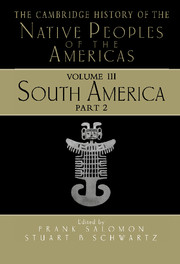Book contents
- Frontmatter
- Contents
- Illustrations
- 14 The Crises and Transformations of Invaded Societies: The La Plata Basin (1535–1650)
- 15 The Colonial Condition in the Quechua-Aymara Heartland (1570–1780)
- 16 Warfare, Reorganization, and Readaptation at the Margins of Spanish Rule: The Southern Margin (1573–1882)
- 17 The Western Margins of Amazonia from the Early Sixteenth to the Early Nineteenth Century
- 18 Warfare, Reorganization, and Readaptation at the Margins of Spanish Rule – The Chaco and Paraguay (1573–1882)
- 19 Destruction, Resistance, and Transformation – Southern, Coastal, and Northern Brazil (1580–1890)
- 20 Native Peoples Confront Colonial Regimes in Northeastern South America (c. 1500–1900)
- 21 New Peoples and New Kinds of People: Adaptation, Readjustment, and Ethnogenesis in South American Indigenous Societies (Colonial Era)
- 22 The “Republic of Indians” in Revolt (c. 1680–1790)
- 23 Andean Highland Peasants and the Trials of Nation Making during the Nineteenth Century
- 24 Indigenous Peoples and the Rise of Independent Nation-States in Lowland South America
- 25 Andean People in the Twentieth Century
- 26 Lowland Peoples of the Twentieth Century
- Index
23 - Andean Highland Peasants and the Trials of Nation Making during the Nineteenth Century
Published online by Cambridge University Press: 28 March 2008
- Frontmatter
- Contents
- Illustrations
- 14 The Crises and Transformations of Invaded Societies: The La Plata Basin (1535–1650)
- 15 The Colonial Condition in the Quechua-Aymara Heartland (1570–1780)
- 16 Warfare, Reorganization, and Readaptation at the Margins of Spanish Rule: The Southern Margin (1573–1882)
- 17 The Western Margins of Amazonia from the Early Sixteenth to the Early Nineteenth Century
- 18 Warfare, Reorganization, and Readaptation at the Margins of Spanish Rule – The Chaco and Paraguay (1573–1882)
- 19 Destruction, Resistance, and Transformation – Southern, Coastal, and Northern Brazil (1580–1890)
- 20 Native Peoples Confront Colonial Regimes in Northeastern South America (c. 1500–1900)
- 21 New Peoples and New Kinds of People: Adaptation, Readjustment, and Ethnogenesis in South American Indigenous Societies (Colonial Era)
- 22 The “Republic of Indians” in Revolt (c. 1680–1790)
- 23 Andean Highland Peasants and the Trials of Nation Making during the Nineteenth Century
- 24 Indigenous Peoples and the Rise of Independent Nation-States in Lowland South America
- 25 Andean People in the Twentieth Century
- 26 Lowland Peoples of the Twentieth Century
- Index
Summary
INTRODUCTION
The nineteenth century marks a critical turning point in the long, violent history of colonial encounters among economic élites, political authorities, and native Andean peasantries. Between the late eighteenth century and the early twentieth century, fledgling Andean republics emerged from the chaos of the independence era. Slowly, haltingly they began to dismantle the political and administrative apparatus of colonial rule. By 1825 they had broken the colonial bond, but the greatest challenges of nation building still lay ahead.
Deeply divided by ethnic, cultural, and class differences, yet born of Enlightenment principles of liberty, equality, and citizenship, the new republics of Colombia, Ecuador, Peru, and Bolivia were shaped by conflicts and contradictions inherent in postcolonial projects of modernity. For much of the nineteenth century, the defining political issue in these Andean republics was whether, and how, the republics should redefine and restructure the colonial relationship based on principles of caste and corporatism and codified in Hapsburg law as “dual republics.” Indeed the very notions of república, nation, and race were semantic battlefields on which fractured élites and subject populations contentiously worked out meanings and legitimacies of political authority. They debated Indian rights following the collapse of the Catholic monarchy and the crisis of Bolivarian liberalism in the 1810s and 1820s. The postindependence years brought an avalanche of peasant claims and protests over the ambiguous and shifting terms of Indian integration into the new nations as war-weary republics withdrew ambitious liberal agendas thrust upon them by the liberators and instead looked for ways to restore a precarious pax republicana. But in the political-ideological void opened by independence, state power tended in turn to fragment and devolve to provincial élites and local authorities; liberal land reforms languished; tribute was restored; and Andean regional and export markets remained sluggish. This transitory political reprieve opened new spaces for Andean peoples to negotiate political pacts, recover lost lands, restore ethnic authorities, rearrange translocal networks of patronage, kinship, barter, and trade, and engage in ritual religious activities away from the watchful eye of modern nation builders. But if the postindependence decades of liberal retreat and agrarian decompression relaxed certain pressures on Andean lands, livelihoods, and corporate identities for several decades, they only heightened the political violence intrinsic to modern state making and incipient capitalist development in the Andes in the second half of the nineteenth century.
- Type
- Chapter
- Information
- The Cambridge History of the Native Peoples of the Americas , pp. 558 - 703Publisher: Cambridge University PressPrint publication year: 1999
- 33
- Cited by

